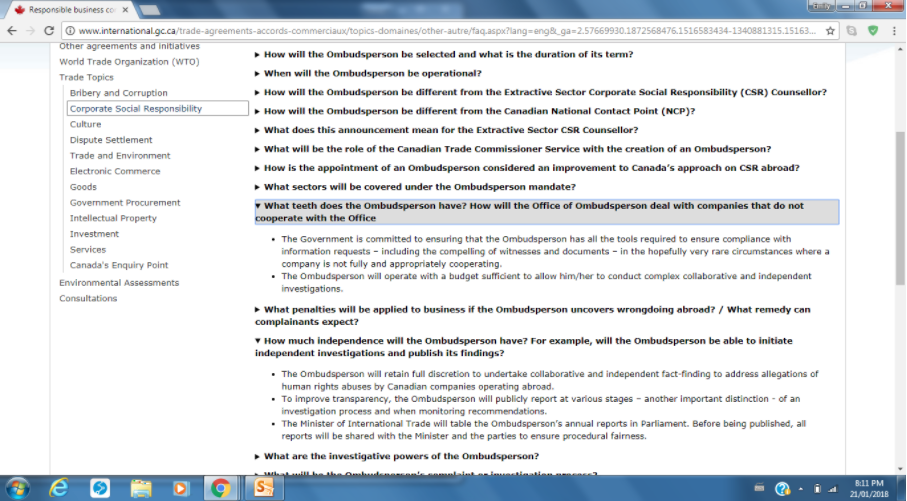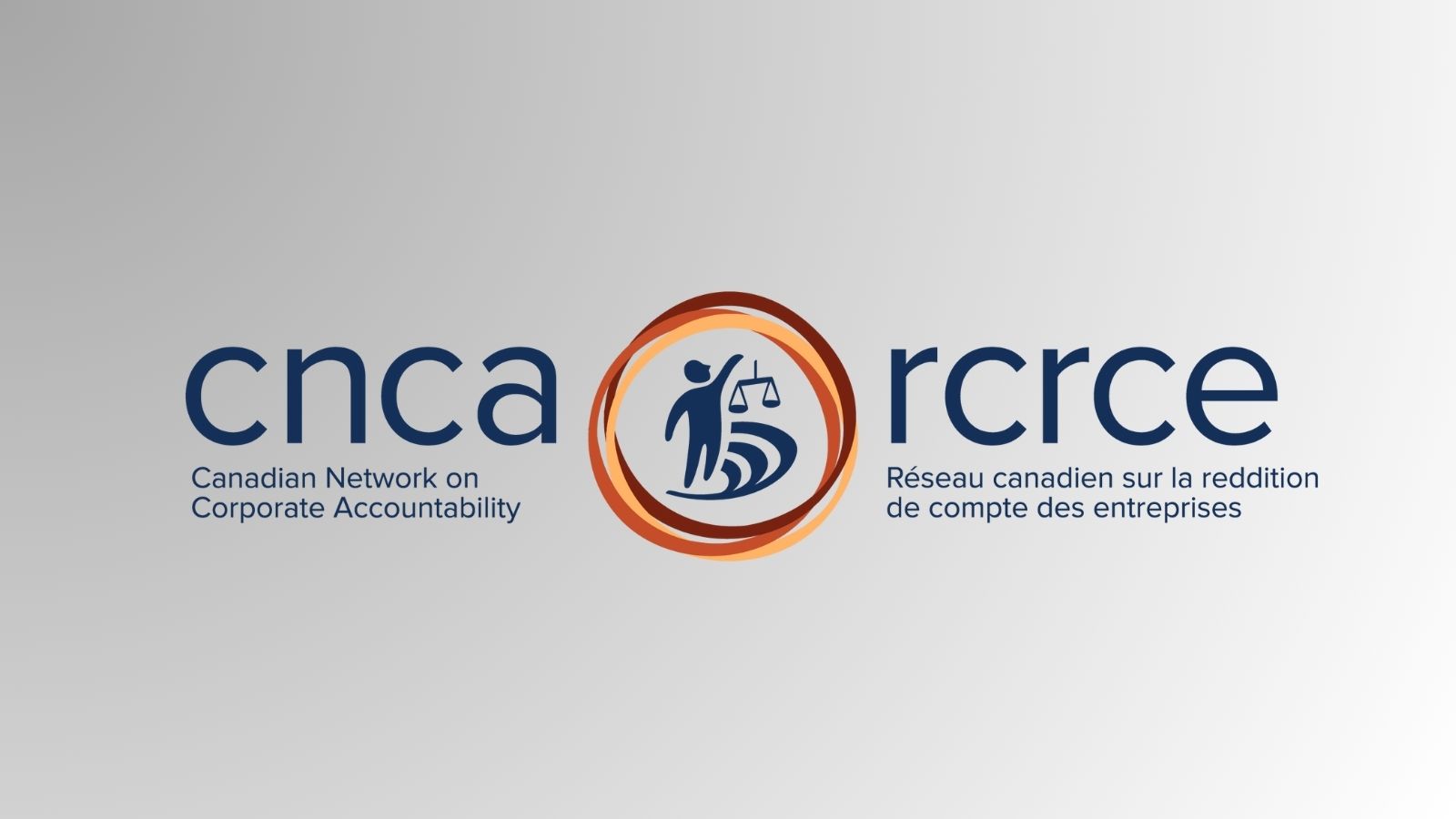In January 2018 the Government of Canada announced the creation of an independent ombudsperson office with robust powers to investigate allegations of human rights abuse tied to Canadian corporate activity overseas. The Government of Canada has still not delivered on its promise of an independent ombudsperson with power to investigate.
The Canadian Network on Corporate Accountability has spent over a decade advocating for a human rights ombudsperson with real powers to investigate abuses and redress the harms caused by Canadian companies operating abroad. The federal government finally announced the creation of such an independent watchdog in 2018, and pledged that the office would have the crucial powers to compel testimony and the production of documents from companies. This announcement was applauded by civil society and labour groups, including the CNCA.
Despite its explicit and public commitment, the government subsequently bowed to industry pressure and gutted the office’s powers before it even got off the ground. In April 2019, the government created a powerless advisory post that differed little from the discredited offices that had come before it. Sheri Meyerhoffer was appointed as the Special Advisor to the Minister of International Trade Diversification, to be known as the Canadian Ombudsperson for Responsible Enterprise. It remains an ombudsperson in name only, without the independence and powers that are the foundation of an effective office.
This screenshot taken after the January 2018 announcement of the CORE shows the government’s commitment to provide the office with the power to compel witnesses and documents. It has since been removed from the government’s website:

At the time, Minister Carr said that the promised powers to independently investigate would need to wait a little longer – until the results of an external legal review were made public, in just a few weeks’ time. The report remained buried for over a year and a half, and the office of the CORE remains powerless to this day.
Our analysis of the serious deficiencies of the CORE’s mandate are available here and here.
"It was because of assurances that the CORE would have independence and real investigatory powers that we stood alongside the government in January 2018 and we promoted the announcement both nationally and internationally."
— Alex Neve, Secretary General, Amnesty International Canada
Will the CORE be transformed into the Ombudsperson that was promised?
Building on expert legal advice Canada commissioned in the spring of 2019 (known as the McIsaac report), Minister of International Trade Diversification Jim Carr acknowledged in a September 2019 letter to the CNCA that the CORE needed investigatory powers to be effective, and committed to creating a “stand-alone legal framework for the office, including stipulating its powers to compel documents, witnesses, and other key testimony.” Ms. Meyerhoffer has publicly stated that she would also be pressing the government for these powers.
The McIsaac report was concealed from public view for over a year and a half, until it was leaked in 2021. The report indicates that the minister commissioned this expert report to advise him on “how to equip the Canadian Ombudsperson for Responsible Enterprise (CORE) with sufficient tools to engage in credible and effective investigations of alleged human rights abuse and to ensure that she has the powers to compel witnesses and documents.”
Key observations from the McIsaac report:
-
- “While the best way to ensure that the CORE has the necessary powers to compel witnesses and the production of documents would be to enact legislation to establish the CORE, appointing the CORE as a commissioner under Part I of the Inquiries Act could also achieve that objective, while, at the same time, retaining the overall mandate currently envisaged for the CORE.” (emphasis added)
- “If the CORE is structured as an ombudsperson appointed as a Ministerial Advisor, as is currently the case, its effectiveness will be dependent on the cooperation of the complainant and the entity being investigated.” (emphasis added)
- “…it is fair to say that without a way to compel the cooperation of the entities against which a complaint is made or others who may hold relevant information, the CORE’s effectiveness may be compromised.” (emphasis added)
In November 2020, the CNCA learned from the office of the Minister of Small Business, Export Development and International Trade, Mary Ng, that Canada would be reneging on its commitment and would not be equipping the office with the powers to compel documents and testimony. Despite the findings of the McIsaac report and the Government of Canada’s public commitments to creating a CORE with powers to investigate, the CORE would remain an ombudsperson in name only.
Can wait no longer
The COVID-19 pandemic has not made the institution of corporate accountability any less urgent. Quite the contrary. In addition to the new public health crisis, in some cases, the human rights risks faced by workers, women, Indigenous peoples, and human rights and environmental defenders negatively impacted by Canadian business operations have been exacerbated.
For example, Canadian mining companies have used the cover of the pandemic to advance their controversial projects, and basic workers’ rights in the garment sector – such as being paid for the work you have completed – have been threatened as fashion brands, including those who produce for Canadian markets, have cancelled orders.
In addition, the urgency in seeing an empowered CORE is heightened by the fact that the CORE opened its doors to complaints in early 2021. Without independent investigatory powers, the CORE remains unfit for purpose and will suffer the same fate as its predecessors, including the National Contact Point.
Given the absence of the basic minimum powers to fulfill the CORE’s mandate, CNCA members have felt the obligation to warn our global partners to approach the CORE with caution.
Legislation to empower the CORE has been tabled
In March of 2022, a game-changing bill was introduced in the House of Commons: Bill C-263, An Act to establish the Office of the Commissioner for Responsible Business Conduct Abroad and to make consequential amendments to other Acts, would finally invest the CORE with the power to produce documents and compel witness testimony under oath.
Canadians, civil society and impacted communities around the world continue to expect Canada to get serious about its international human rights obligations and to put in place effective corporate accountability mechanisms. We expect the government to fulfill its commitments. We will not be waiting silently.
How can the Canadian Ombudsperson for Responsible Enterprise (CORE) be transformed into an independent office with the power to investigate?
The Canadian Ombudsperson for Responsible Enterprise (CORE) can’t be transformed into an independent office, nor given the investigatory powers it needs, without the passing of a new law or a new order in council (OIC) under the Inquiries Act (along with a companion order in council under the Financial Administration Act).
The CNCA has developed model legislation (2016) and a model order in council (2019) showing exactly how to create an ombudsperson office to effectively address human rights abuses by Canadian multinational business.
In response to misleading assertions made by some corporate representatives, the CNCA also produced three explainers:





